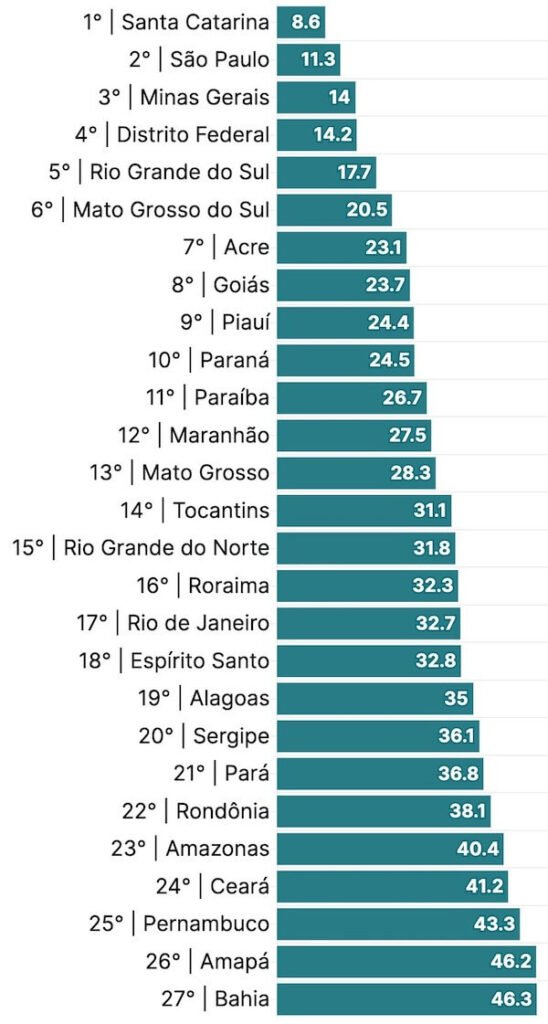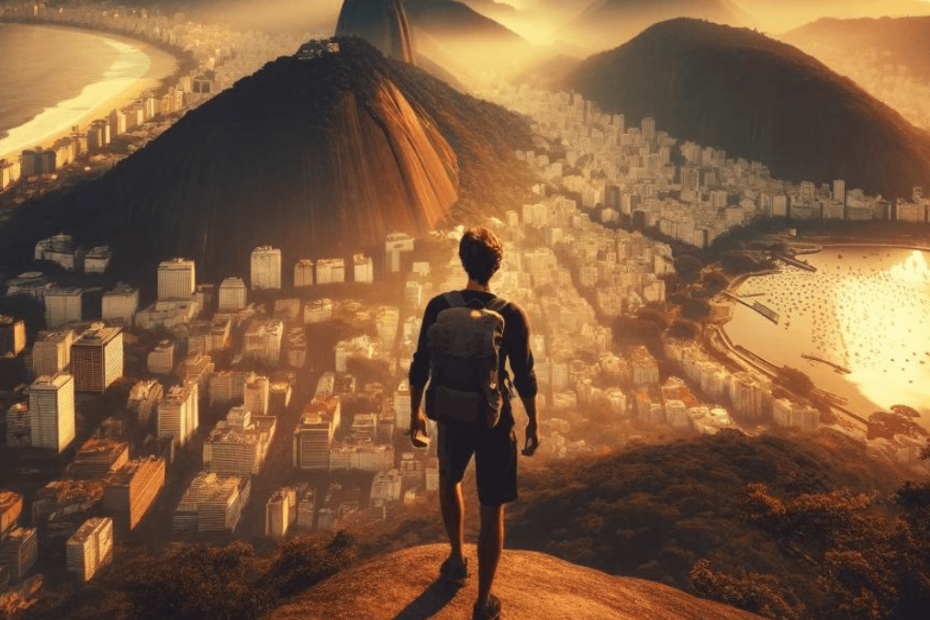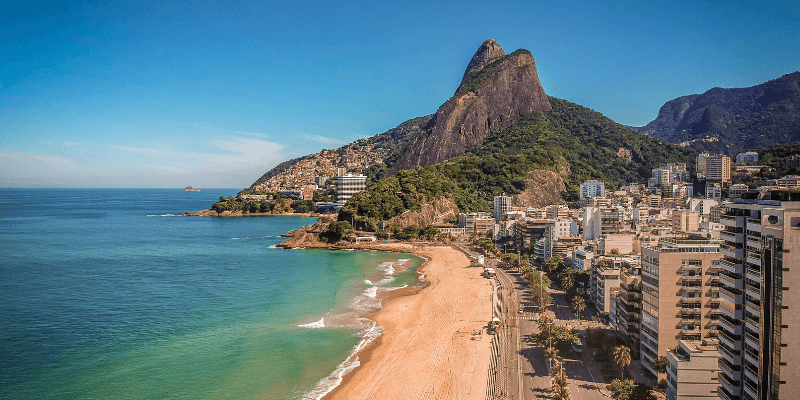- “Is Brazil safe to travel alone?” Yes, Brazil is a safe country to travel alone, but you need to be careful;
- Understand regional safety nuances;
- Embrace cultural awareness and interaction;
- Prioritize health and medical preparedness;
- Leverage technology for safe connections;
- Enjoy Brazil’s culinary delights with caution.
Welcome to Brazil, a country where the rhythm of the samba, the rush of the waterfalls, and the warmth of its sun-kissed beaches create an unforgettable tapestry of experiences.
However, the melody of Brazil’s allure comes with a note of caution, especially for those journeying alone.
Safety, a universal concern for travelers worldwide, holds particular significance here. While Brazil is a country of immense beauty and warmth, it’s also one where navigating safely requires knowledge, preparation, and mindfulness.
The essence of solo travel lies in the freedom to explore, discover, and connect, but this freedom also comes with the responsibility of ensuring your journey is as safe as it is exhilarating.
Is Brazil Safe to Travel Alone?
As a Brazilian, I’d say yes, but that doesn’t mean you shouldn’t be careful.
Indeed, Brazil’s security record is not the best, and this also affects those who live here, and these situations of lack of security do happen, but just like a local, you can also avoid them by being a solo traveler.
Understanding Brazil’s Safety Landscape
Navigating the safety landscape of Brazil requires an understanding of its diverse regions and the varying levels of safety they offer. Brazil, like any large country, has areas where safety is a concern, with crime rates fluctuating between cities and rural areas.
Urban centers, particularly in larger cities such as Rio de Janeiro and São Paulo, tend to have higher instances of petty crime and theft, which are common in crowded tourist areas. Additionally, some regions may experience more serious crimes.
For example, Rio de Janeiro is a city where you have to be careful to avoid problems related to your safety, but just an hour away is the city of Petrópolis, which is a very safe place.
Therefore, Brazil’s reputation for lack of security is much more linked to the big cities.
Also See: Food In Brazil: A Journey Through 31 Dishes
Regional Safety Overview
In Brazil, the safety of travelers can vary significantly from one region to another, painting a diverse picture of the country’s safety landscape.
Brazil has 27 states, check out their safety rates below, presented from lowest to highest:

An interesting fact about this graph is that the state of São Paulo has one of the lowest rates of violence in the country, but if the city of São Paulo, the largest in Brazil, is one of the most dangerous, why isn’t the state?
Simply because the state of São Paulo is also the most populous, but much of that population is spread out in smaller cities in the interior, which are tremendously safer than its capital.
Security in big cities
Cities like Rio de Janeiro and São Paulo, while rich in culture and attractions, demand extra caution due to higher crime rates in certain areas.
Travelers are advised to stay vigilant in tourist-heavy locations like Copacabana and downtown São Paulo, especially after dark. Salvador, with its historic charm, also requires awareness of personal belongings and surroundings.
The most important issue for me here is the fact that you should avoid walking alone in big cities at night and in places that aren’t busy, I for example live in Curitiba the capital of the state of Paraná which is the 8th largest city in the country.
Many Brazilians would say that it is a safe city, but as a local, I avoid going out alone at night as much as possible when it gets dark, unless I’m going to walk in a busy place that has a lively nightlife, which is not the case in my neighborhood.
When I’m traveling in small towns or more touristy areas with a lively nightlife, walking alone at night isn’t such a problem.
Organized crime and high homicide rates
One of the things that can frighten a solo traveler when considering a trip to Brazil is the high homicide rates, again, mainly in the big cities.
This is because in some regions of Brazil the presence of organized crime, which controls drug trafficking above all, is very large, so clashes between rival groups and with the police are frequent, increasing the number of people murdered in the country.
I think that for both locals and tourists, the problem of muggings is much more serious, but with regard to organized crime, take two precautions: don’t get involved with people who are part of factions and don’t travel in areas dominated by these factions, unless you’re going with a local.
This happens a lot in the favelas of Rio de Janeiro, I’ve met foreign friends who went to venture out at night in a favela very close to Copacabana, they were met by drug dealers with big guns, who were even cordial, but warned them that they couldn’t be there for their own safety.
“Don’t use your cell phone here”
One of the security problems in Brazil that affects me the most and that I warn tourists about is the use of cell phones and other equipment such as cameras anywhere.
When you’re on the streets of a big city, always look for an establishment such as a café, a shopping mall or even a police station to use your cell phone next to.
I myself avoid taking my cell phone out of my pocket as much as possible when I’m walking around my city, for two reasons:
- 1 – someone might pass by quickly and pull out my cell phone,
- 2 – it might distract me from a dangerous situation, like seeing a mugger approaching.
Another tip I have, and I’m glad I’ve never had to use it, is to always carry a cell phone “ready to be stolen”.
When I go out with my backpack, I always put an old cell phone in it that doesn’t work anymore, so that if I get mugged, I can be lucky enough to lose the cell phone I use.
Of course there are exceptions, many cities, even large ones, have their safe areas where the number of thefts and robberies is much lower.
To find out if you’re in one of these places, you can observe the behavior of the locals, if they’re walking slowly and fiddling with their cell phones, you’re probably in a safe place.
Ask for information and be careful with maps
Maps are good for showing distances and routes, but not the safety of a place.
You may think that 500 meters to get out of a city’s bus station and walk to your hotel is easy, but that’s not true if you’re in Rio de Janeiro, São Paulo or Curitiba, cities that have a very degraded area around the bus station.
So try to ask your host beforehand if it’s safe to walk to your accommodation. The same goes for anywhere you’re going, sometimes you’re in a safe place, and you go to another area that’s also safe, but to do so you’ll have to cross some streets that aren’t so safe.
Plan your trip to Brazil
Is Brazil Safe for a Woman Traveling Alone?
For women traveling solo in Brazil, staying safe is about blending preparedness with intuition. Here are essential tips to navigate your journey securely:
- Stay Informed: Before arriving, research the safest neighborhoods for accommodations and the cultural norms of your destinations;
- Dress Appropriately: While Brazil is known for its relaxed beach culture, but, dressing conservatively in urban and rural areas can help avoid unwanted attention;
- Use Trusted Transportation: Opt for reputable taxi services or ride-sharing apps, especially at night, and always verify the vehicle’s identification;
- Keep Valuables Discreet: Avoid displaying expensive jewelry or gadgets in public to deter potential thieves;
- Trust Your Instincts: If a situation doesn’t feel right, trust your intuition and remove yourself from it. Safety should always be your priority.
By following these guidelines, female solo travelers can enjoy Brazil’s wonders while minimizing risks, ensuring a memorable and safe adventure.
Support Networks and Resources
For women embarking on a solo journey through Brazil, leveraging support networks and resources can significantly enhance safety and enrich the travel experience.
Engaging with online communities such as Solo Female Travelers or Women Who Travel offers a platform to share experiences, seek advice, and connect with fellow adventurers who can provide insights specific to Brazil.
These forums are invaluable for gaining real-time tips and support.
Utilizing apps designed for traveler safety and connectivity is another smart strategy.
Apps like Tourlina, a platform for finding female travel companions, or SafeTrek, which provides a quick way to alert local authorities in emergencies, can offer peace of mind.
Additionally, the use of location-sharing features with trusted friends or family through apps like WhatsApp or Google Maps ensures someone always knows your whereabouts.
8 Tips to Travel Alone in Brazil
Embarking on a solo journey to Brazil is an adventure that promises to be as enriching as it is exhilarating.
To fully embrace the vibrant culture, stunning landscapes, and spirited rhythm of Brazil while ensuring a safe and memorable experience, preparation is key.
Here are 8 indispensable tips designed to guide you through your solo adventure in Brazil, blending practical advice with local insights to empower your journey.
1 – Visa
Firstly, confirm your visa requirements based on your nationality; many travelers can enter Brazil visa-free for short stays, but it’s crucial to verify this according to the latest regulations.
2 – Health
Next, prioritize your health by consulting a travel health clinic for recommended vaccinations, such as Yellow Fever, Typhoid, and Hepatitis A and B, depending on your itinerary.
3 – Travel Insurance
Lastly, securing comprehensive travel insurance is non-negotiable. It should cover medical emergencies, theft, and trip cancellations to safeguard your adventure. Ticking these boxes early on ensures peace of mind, letting you focus on the excitement ahead.
4 – Cash and Cards
Carry only the cash you need for the day and use ATMs in secure locations, such as inside banks or shopping centers, during daylight hours. Keep a separate stash of emergency cash and a backup card in a different location from your wallet.
Also See | Brazil Money: From its Exchange Rate To Its History
5 – Moving Around
When exploring cities, use trusted transportation options. Apps like Uber are widely used and generally safer than hailing taxis on the street. For long-distance travel, choose reputable bus companies or domestic flights for longer routes.
6 – Stay Connected
Use a local SIM card or international roaming to ensure you have access to maps and can make calls in emergencies. Share your travel itinerary with someone you trust and regularly check in.
7 – Nighttime Safety
Avoid walking alone at night, especially in less crowded or poorly lit areas. Opt for socializing in groups and stay in well-trafficked, tourist-friendly zones.
8 – Beach Safety
Keep personal belongings within sight and avoid taking valuables to the beach at big cities. Be mindful of local beach etiquette and safety flags indicating swimming conditions.
Navigating Brazil’s Transport Safely
Navigating the vast and varied landscape of Brazil requires familiarizing yourself with the plethora of transportation options available, each with its own set of considerations for safety.
Public vs. Private Transportation
In Brazil, the choice between public and private transportation can significantly impact your travel experience and safety.
Public transport, including buses and metro systems, is widely available in major cities and is an economical way to get around.
However, it’s important to stay vigilant, especially during peak hours, as crowded conditions can increase the risk of pickpocketing.
Always keep your belongings secure and be aware of your surroundings.
For more personalized and secure travel, private transportation options like taxis and ride-sharing apps (e.g., Uber, 99) are recommended. These services offer the convenience of door-to-door service and the ability to track your journey.
When using taxis, opt for those affiliated with official taxi stands or arrange them through your accommodation to ensure reliability.
Health and Medical Preparedness
Before embarking on your Brazilian adventure, addressing health precautions is essential to ensure a smooth and safe journey.
Vaccinations are your first line of defense; consult with a travel health clinic well in advance of your trip.
Recommended vaccines may include Yellow Fever, especially if you’re visiting certain rural areas, along with Hepatitis A, Typhoid, and Tetanus. Depending on your itinerary, a Malaria prophylaxis might also be advised.
Health Insurance is indispensable.
Ensure your policy covers international travel and includes provisions for medical evacuation and treatment for illnesses and injuries. Verify that your insurance is accepted at hospitals and clinics throughout Brazil.
When it comes to Accessing Medical Care, Brazil has both public and private healthcare facilities. While public hospitals are available to everyone, private hospitals offer faster and often higher-quality care, albeit at a higher cost.
Knowing the location of reputable hospitals or clinics in the areas you’ll be visiting can save precious time in an emergency.
Additionally, keeping a list of emergency numbers, including the local ambulance service, on hand is advisable for immediate assistance.
Understanding Local Laws and Customs
Embarking on a journey to Brazil immerses solo travelers in a vibrant tapestry of cultural practices and traditions.
To navigate this rich landscape respectfully and safely, it’s crucial to understand and adhere to Brazilian laws and customs.
Legal Dos and Don’ts
When traveling solo in Brazil, being mindful of legal dos and don’ts, alongside cultural norms, is essential for a smooth and respectful journey.
Legally, drug possession and trafficking carry severe penalties, including long prison sentences.
Drinking alcohol on the street is legal, but while driving is not only frowned upon but is also illegal in many cities. Always carry identification, as local laws require it.
Culturally, Brazilians value personal relationships and social interactions; thus, being polite and engaging in small talk is appreciated.
Physical contact, such as handshakes or a kiss on the cheek in greetings, is common and reflects warmth and friendliness. However, always observe and follow the local lead, especially in more conservative or rural areas.
Respecting quiet hours (typically 10 PM to 8 AM in residential areas) is important to avoid complaints or legal issues.
Solo Traveler’s Guide to Brazilian Cuisine
Embarking on a solo journey through Brazil offers more than just scenic landscapes and vibrant cities; it’s a culinary adventure waiting to unfold.
Must-Try Dishes and Food Safety
In Brazil, your culinary journey should include sampling iconic dishes like feijoada, a hearty black bean stew with pork, and moqueca, a fragrant seafood stew.
Don’t miss acarajé, a spicy street food delight from Bahia, or the ubiquitous coxinha, a tear-shaped chicken croquette. For a sweet treat, brigadeiros (chocolate truffles) are a must.
To eat safely, opt for busy eateries with high turnover, ensuring freshness. Be cautious with street food, choosing vendors where food is cooked to order.
Drinking bottled water and avoiding raw foods in informal settings can also help prevent stomach upsets, letting you savor Brazil’s culinary offerings worry-free.
Please be careful what you eat on the beaches. In Brazil, it’s common to find food vendors on the beaches selling everything.
Some of these foods have a very high potential for causing food poisoning, and I even find it funny that some of them are only consumed by tourists, few locals venture out to try them:
- Shrimp on skewers;
- Drinks and juices, such as caipirinhas, served ready-made;
- And any other food that is exposed and not properly packaged in a cooler.
Making Connections: Socializing and Safety
Socializing is a vibrant part of the solo travel experience, especially in Brazil, where the culture thrives on connection and warmth.
However, doing so safely is paramount to ensure your adventure remains joyful and secure.
Navigating social interactions thoughtfully allows you to immerse in Brazil’s rich social tapestry, making new friends and experiencing the genuine hospitality that defines this nation, all while maintaining your well-being.
Using Technology to Connect
In today’s digital age, technology offers solo travelers in Brazil invaluable tools for connecting safely.
Apps like Meetup and Couchsurfing facilitate encounters with locals and fellow travelers through group activities or events, often centered around shared interests.
For those looking to learn and exchange languages, Tandem and HelloTalk provide platforms to connect with language partners, offering a cultural exchange in a safe, controlled environment.
Participating in Group Activities
Joining group tours or activities is a fantastic way for solo travelers in Brazil to meet people and explore safely.
Consider signing up for guided tours to iconic destinations like the Amazon rainforest or the historic streets of Salvador.
Adventure clubs and hostels often organize group outings, from hiking trips to local music nights, providing a social and secure way to experience Brazil’s diverse attractions.
In big cities, the easiest way to make friends is definitely by going to hostels, even if you’re not staying in one of them.
Embracing Brazil: A Solo Journey’s Reflection
Embarking on a solo journey through Brazil offers an unparalleled opportunity to immerse yourself in vibrant cultures, breathtaking landscapes, and culinary delights.
By understanding the safety landscape, respecting local laws and customs, and engaging with the community through technology and group activities, solo travelers can navigate this beautiful country with confidence.
Remember, preparation and mindfulness are your best companions, allowing you to embrace the warmth and diversity of Brazil fully.
Let these insights guide you as you explore, connect, and discover the wonders of Brazil solo, ensuring a journey that’s as safe as it is enriching. Safe travels and enjoy the adventure that awaits you in the heart of South America!
Ready to dive into the adventure of a lifetime? Start planning your solo journey to Brazil with both safety and enjoyment at the forefront.
Embrace the vibrant culture, stunning landscapes, and warm connections waiting for you. Equip yourself with knowledge, pack your spirit of adventure, and let Brazil’s magic unfold. Safe travels!




